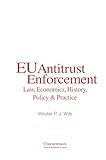EU Antitrust enforcement: law, economics, history, policy and practice
Por: Wils, Wouter P. J .
.
Tipo de material:  LibroSeries Concurrences: Competition Law Review.Editor: New York: Institute de Droit de la Concurrence 2024Descripción: 412 p.; 24 cm.Tipo de contenido: Texto (visual) Tipo de medio: sin mediación ISBN: 978-1-939007-65-0.Tema(s): Competencia
LibroSeries Concurrences: Competition Law Review.Editor: New York: Institute de Droit de la Concurrence 2024Descripción: 412 p.; 24 cm.Tipo de contenido: Texto (visual) Tipo de medio: sin mediación ISBN: 978-1-939007-65-0.Tema(s): Competencia| Tipo de ítem | Ubicación actual | Signatura | Estado | Fecha de vencimiento | Código de barras |
|---|---|---|---|---|---|
 Libro
Libro
|
Biblioteca y Centro de Documentación CNMC - Biblioteca de Competencia
Biblioteca especializada en Derecho de la Competencia, Derecho Mercantil y Economía Dirección C/ Barquillo, nº 5, 28004 Madrid
|
LIB-2693 (Navegar estantería) | Disponible | 10332 |
Navegando Biblioteca y Centro de Documentación CNMC - Biblioteca de Competencia Estantes Cerrar el navegador de estanterías
EU antitrust enforcement has been radically transformed in the past thirty years. Following the decentralisation brought about by Regulation 1/2003, the European Commission now shares the public enforcement of Articles 101 and 102 TFEU with the competition authorities of the EU Member States. Public enforcement has furthermore changed through the use of leniency, settlements and prioritisation. Private antitrust enforcement, in particular in the form of follow-on actions for damages in cartel cases, has significantly increased, raising delicate questions as to the optimal balance and interaction between public and private enforcement. Increased antitrust enforcement has also brought renewed attention to the procedural rights of defendants and third parties in public antitrust enforcement, and the compatibility of the existing enforcement system and practices with the European Convention on Human Rights and the EU Charter of Fundamental Rights.
Blending legal and economic analysis, and drawing on decades of practical experience, this book analyses in detail the main questions of law and policy raised by this historical transformation of EU antitrust enforcement and by its current state.
Table of contents
Introduction and acknowledgments
Table of cases
Index
I. Regulation 1/2003: An assessment after twenty years
II. The obligation for the competition authorities of the EU member states to apply EU antitrust law
III. Independence of competition authorities: the example of the EU and its member states
IV. Discretion and prioritisation in public antitrust enforcement
V. The use of leniency in EU cartel enforcement: An assessment after more than twenty years
VI. The use of settlements in public antitrust enforcement: objectives and principles
VII. Antitrust compliance programmes and optimal antitrust enforcement
VIII. Recidivism in EU antitrust enforcement: A legal and economic analysis
IX. The compatibility with fundamental rights of the EU antitrust enforcement system in which the european commission acts both as investigator and as first-intance decision maker
X. Fundamental procedural rights and effective enforcement of articles 101 and 102 TFEU in the European Competition Network
XI. The role of the hearing officer in antitrust proceedings before the European Commission
XII. The oral hearing in antitrust proceedings before the European Commission
XIII. Legal Professional privilege in EU Antitrust Enforcement: Law, policy and procedure
XIV. Procedural rights and obligations of third parties in antitrust investigations and proceedings by the European Commission
XV. Publication of Antitrust decisions of the European Commission
XVI. Re-adoption by the European Commission of Cartel decisions annulled on procedural ground by the Eu courts
XVII. Private enforcement of EU antitrust law and its relationship with public enforcement: Past, present and future
XVIII. Should the damages directive be revised to grant companies that have received immunity from fines under the competition authorities' leniency programmes also immunity from damages?







No hay comentarios para este ejemplar.